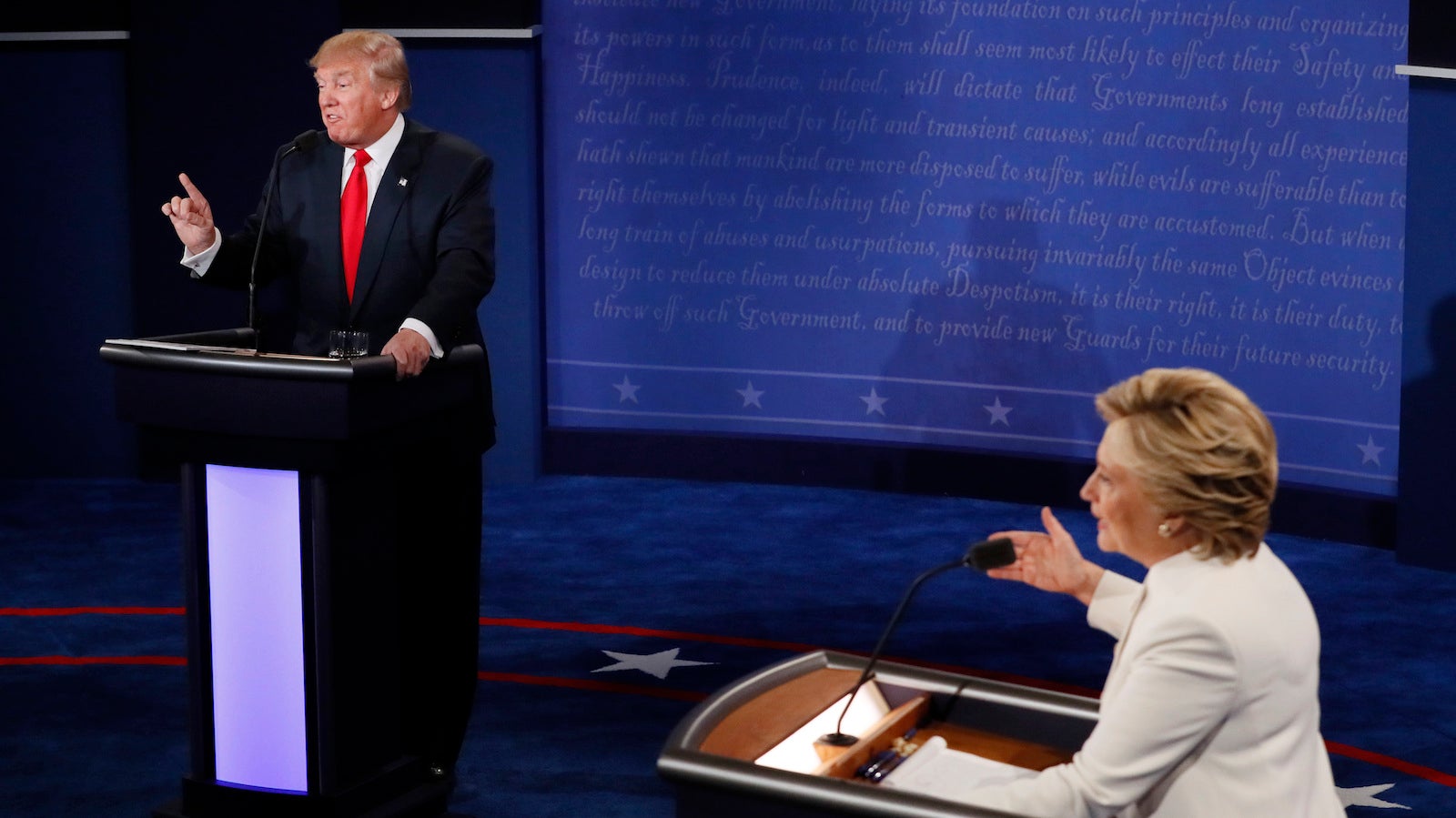Linguistics offers an unexpected explanation for Donald Trump’s constant manterruptions
Donald Trump’s speaking style is to do to his opponent exactly what he wants to do to the political system: interrupt it.


Donald Trump’s speaking style is to do to his opponent exactly what he wants to do to the political system: interrupt it.
In typical cooperative conversation, people don’t interrupt each other all that often. Across languages and cultures, a person tends to wait about 200 milliseconds after their conversation partner is done talking before they respond. That’s a very short gap (we are made uncomfortable by long silences), but it’s a gap nonetheless.
Of course, that’s not what we’ve seen in the debates. To choose just one of several examples of crosstalk from last night’s debate (Oct. 19), Trump interjected “Wrong!” three times during a 75-word response from Clinton about Trump’s support of the war in Iraq. The New York Times also counted 40 Trump interruptions during the first debate, compared to just one instance where Hillary Clinton interrupted him.
Commentators have argued that Trump’s interruptions reflect sexist tendencies that will turn off female voters, saying that many women “see in Trump every man who has interrupted them in a work meeting.” Indeed, it’s hard for Trump to avoid accusations of sexist behavior in his speaking style. Just look at his interjection during Clinton’s discussion of Social Security last night: “Such a nasty woman”.
Every January, hundreds of linguists attend the American Dialect Society’s annual Word of the Year vote and debate the most important new words of the previous year. In 2015, “manspreading” made it to the final vote, and 2014’s vote included a variant of “mansplaining.” If this trend continues, 2016 may well be the year of the “manterruption.”
Defined as a man’s unnecessary interruption when a woman is speaking, manterrupting has popped into the public consciousness during the recent presidential and vice-presidential debates. After watching Trump interject comments while Clinton was talking through all three of their debates (and Mike Pence and Tim Kaine interrupting moderator Elaine Quijano during theirs), the internet has been awash with accusations of manterrupting:
Though the term manterrupting is mostly a phenomenon that lives within the social feeds and comment sections of the internet, there is academic research to back it up. Numerous studies have proven that men tend to interrupt women more often than women interrupt men: A 2014 study from the George Washington University found that people of both sexes tend to interrupt women more often than they interrupt men, and in a classic 1975 study of casual conversations between men and women, men were responsible for 47 out of 48 interruptions.
Are Trump’s interruptions just an extreme example of the manterruption phenomenon? Maybe. But there’s also something else going on. Because although there’s plenty of evidence that The Donald doesn’t hold women in very high regard, he doesn’t just interrupt women—he butts in on men, too. He interrupted Jeb Bush seven times over the course of just 80 words during one primary debate, and in last night’s debate, he interrupted moderator Chris Wallace seven times during Wallace’s question about Aleppo alone.
As a linguist, I’d argue that Trump’s seemingly impulsive behavior is actually something he does consciously and intentionally—and not just because of his gender. Despite his spotty business record, Trump is a businessperson who has written (or has at least hired a ghostwriter to write) several books on making deals. It’s therefore likely that his brash interruptions are examples of a time-testing practice in negotiation: misdirection.
Master pickpocket Apollo Robbins calls this kind of behavior a “pattern interrupt.” Unexpected behavior and speech patterns are a way of throwing people out of their usual modes of thinking. Once you’ve caught your audience off-guard and have them concentrating more on how you say something rather than what you say, you can use your audience’s surprise to take something from them. For example, a thief will approach a husband and wife on the street and shake the man’s hand, calling him “Coach” and acting like they’re old friends. While the husband and wife are occupied trying to figure out why this stranger thinks he knows the man, the thief is reaching into the wife’s purse and pulling out her wallet.
Trump is no stranger to pattern interrupts; he’s used various tactics, both in business and politics, to try to throw his opponents off their game. Most politicians are quite adept at using pattern interrupts to surprise and embarrass their competitors on the public stage. Think Lloyd Bentsen’s “Senator, you’re no Jack Kennedy” line in 1988, or Joe Biden’s “With all due respect, that’s a bunch of malarkey” in 2012.
In comparison, Hillary Clinton tends to take long, careful pauses when she speaks to think through her phrasing and the points she wants to make. In today’s political climate, this can be a liability. Pausing leaves you more open to interruption yourself, as your conversation partner—whether they intend to or not—can easily misinterpret (or take advantage) of it. As Trump has shown, he doesn’t need even that short time gap to butt in when someone else is speaking.
Trump’s unique speaking style—going off-script, interrupting others, and frequently interrupting even himself—has polarized Americans. His supporters admire that he “tells it like it is”, suggesting that his unpolished speech makes him more like the average voter. Critics call it sociopathic, arguing that his tendency to self-interrupt is evidence of a lack of impulse control.
The truth is that Trump’s speech is probably not as improvised as his fans think, nor as impulsive as his detractors claim. Instead, it’s a well-practiced tactic by a man who sees every conversation as a competition he is determined to win.